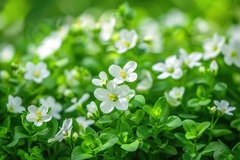Botanical supplement industry offers new guidance on bacopa mislabeling and adulteration
The US Botanical Adulterants Prevention Program (BAPP) has published a new bulletin aimed at preventing the adulteration and mislabeling of bacopa (Bacopa monnieri). In India, the herb is widely used as a cognition and memory supplement. It shares the common Sanskrit name brahmi with another plant of similar properties, gotu kola (Centella asiatica), which is often the root of confusion.
Ayurvedic literature acknowledges the two plant species as legitimate substitutes for each other when used medicinally.
“Due to the use of the same common name for bacopa and gotu kola in some languages, and the interchangeable use in traditional Ayurvedic medicine, these two plants are sometimes mislabeled in the botanical trade,” says Stefan Gafner, PhD, chief science officer at the American Botanical Council, one of the partner organizations in the program.
“Such mislabeling is readily detected by analytical laboratory testing. However, manufacturers should be aware of the nomenclatural confusion and take appropriate steps to ensure the correct botanical identity of their materials.”
The newly published “Botanical Adulterants Prevention Bulletin” summarizes the available scientific data on adulteration and mislabeling of the aerial parts of bacopa, discusses analytical methods to detect adulteration, and offers information about the taxonomy, uses, supply, and market status of bacopa.
Nineteen US-based and international experts in quality control of medicinal plants from non-profit organizations, contract analytical laboratories, and the herb industry provided peer-review input on the bulletin.
 Although bacopa and gotu kola have overlapping therapeutic uses and nomenclature, their phytochemical constituents, modes of action, and some of their pharmacological effects differ.The Botanical Adulterants Prevention Program is run by ABC, the American Herbal Pharmacopoeia, and the National Center for Natural Products Research at the University of Mississippi, US.
Although bacopa and gotu kola have overlapping therapeutic uses and nomenclature, their phytochemical constituents, modes of action, and some of their pharmacological effects differ.The Botanical Adulterants Prevention Program is run by ABC, the American Herbal Pharmacopoeia, and the National Center for Natural Products Research at the University of Mississippi, US.
“The primary purpose of our researching and publishing the bacopa bulletin was to clarify a nomenclatural issue. Nevertheless, as the bulletin documents, bacopa can also be subject to intentional adulteration and fraud for economic reasons, which adds further value to our publication,” says Mark Blumenthal, founder and executive director of the American Botanical Council.
Distinct pharmacological effects
Bacopa is a revered herb in Ayurveda and is known for its ability to enhance concentration, memory, and visual impression processing. The aerial parts of the plant are used as an ingredient in dietary supplements to enhance cognitive function and improve focus, mental performance, and memory recall.
Bacopa preparations have also shown benefits for people who suffer from insomnia, stress, and anxiety.
“Although B. monnieri and C. asiatica have overlapping therapeutic uses, their phytochemical constituents, modes of action, and some of their pharmacological effects differ,” stresses the American Botanical Council.
“Nevertheless, due to the use of the same common name, accidental mislabeling of bacopa and gotu kola materials and products in the market are reported on a regular basis.”
Blooming bacopa market
The new BAPP bulletin was written by Nilüfer Orhan, Ph.D., an expert in natural products chemistry and pharmacology.
She has previously authored or co-authored bulletins on nigella (Nigella sativa) and boswellia (Boswellia serrata), as well as a St. John’s wort (Hypericum perforatum) laboratory guidance document and a paper estimating the extent of adulteration of five popular botanical ingredients published in the peer-reviewed journal Natural Products Reports.
In the US, the American Botanical Council highlights that bacopa-based supplements ranked 34th among the top-selling herbal dietary supplements in the natural channel and 35th in the mainstream channel in 2023, with over US$13.5 million in combined sales.
The “Botanical Adulterants Prevention Bulletin” is freely accessible on the American Botanical Council’s website.
In other recent moves toward supplement standardization, Nammex, a US supplier of organic functional mushroom extracts, published its latest study establishing a multi-analytical framework to identify authentic chaga canker and assess the quality of commercial dietary supplement products.














